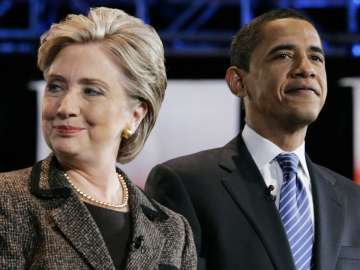US Elections: Barack Obama backs Hillary Clinton for president
Washington: As Hillary Clinton secured enough delegates to be the presumptive nominee of the Democratic Party, President Obama on Thursday endorsed his former secretary of state for the top post urging his partymen to line
Washington: As Hillary Clinton secured enough delegates to be the presumptive nominee of the Democratic Party, President Obama on Thursday endorsed his former secretary of state for the top post urging his partymen to line up behind her. The two will campaign together next week in Wisconsin.
It was all part of a carefully orchestrated pressure campaign aimed at easing Clinton rival Bernie Sanders toward the exit and turning fully to the fight against Republican Donald Trump.
Obama's long-expected endorsement, delivered via an online video, included a forceful call for unity and for "embracing" Sanders' economic message, which has fired up much of the liberal wing of his party. Obama sought to reassure Democrats that Clinton shares their values and is ready for the job.
"Look, I know how hard this job can be. That's why I know Hillary will be so good at it," Obama said. "I have seen her judgment. I have seen her toughness. I've seen her commitment to our values."
Obama's testimonial came less than an hour after the president met privately with Sanders at the White House to discuss the future of the senator's "political revolution" — one that will not include him taking up residence at the White House. Sanders emerged from the meeting subdued and indicated he had gotten the message.
In response to Obama's endorsement Republican presidential Trump tweeted: "Obama just endorsed Crooked Hillary. He wants four more years of Obama — but nobody else does!"
The Clinton campaign tweeted back, "Delete Your Account."
Although he stopped short of endorsing Clinton, the Vermont senator told reporters he planned to press for his "issues" — rather than victory — at the party's July convention and would meet with Clinton "in the near future" to discuss ways to defeat Trump.
At an evening campaign rally at Washington's RFK Stadium, Sanders made no mention of Clinton, of trying to win over the party insiders known as superdelegates or of pressing his case at next month's Democratic National Convention.
He barely mentioned next Tuesday's primary election in the city, the last on the Democratic primary calendar.
"It would be extraordinary if the people of Washington, our nation's capital, stood up and told the world that they are ready to lead this country into a political revolution," Sander said in the final sentence of an hour-long address.
In another sign of Democratic unification, Sen. Elizabeth Warren made plans to endorse Clinton. The Massachusetts senator had been the only holdout among the Senate's Democratic women, and her endorsement would send a signal to Sanders' progressive supporters that it's time to unite around the party's presumptive nominee.
Warren's endorsement was to come Thursday evening in an appearance on MSNBC, according to two Senate officials who demanded anonymity to confirm the news ahead of time.
Clinton declared victory over Sanders on Tuesday, having captured the number of delegates needed to become the first female nominee from a major party. Her late and somewhat sputtering victory set off a fresh round of private phone calls and back-channel negotiations, all aimed at sussing out Sanders' demands, easing him out of the race without angering his die-hard supporters and putting the full-court press on Trump.
Obama's endorsement and Sanders' visit were the public culmination of that work.
The White House taped Obama's endorsement video at the White House on Tuesday, before Clinton claimed victory in the primary, and had alerted Sanders earlier in the week that it was coming. Sanders came prepared with his statement.
The careful choreography was part of the Democrats' attempt to show some respect to the senator, even as they steered him toward the campaign off-ramp.
Obama greeted Sanders and his wife in the residence and then strolled with the senator, smiling and laughing warmly, past the Rose Garden to the Oval Office, as cameras recorded the moment.
The ceremony and scrutiny didn't appear to faze Sanders. Ever the everyman, he started the day by stopping for a cup of coffee and a scone at the Peet's coffee shop across from the White House, while dozens of reporters awaited his arrival.
Sanders' campaign spokesman Michael Briggs had little to say about the conversation with the president, saying the men discussed "how we can all work together to create an economy that works for all people and not just the 1 percent."
Leaders on Capitol Hill underscored Obama's message. After leaving the White House, Sanders met with Senate Minority Leader Harry Reid, D-Nev., and Sen. Charles Schumer, D-N.Y., and later with Vice President Joe Biden.
"He's not worn down, he's not bitter, he's not angry," Schumer said after meeting with Sanders. "I told him I was proud of him and what he accomplished."
The party's delicate handling of the Vermont senator reflected Sanders supporters' deep distrust of the Democratic establishment and its meddling in the primary.
Obama made a point of staying publicly neutral through the sometimes-bitter race, mindful that his involvement could tarnish his standing with parts of his own loyal coalition, namely young people and progressives.
Clinton is now counting on the president to help bring those voters on board. Obama has said he's "fired up" and ready to get started.
Obama has competition in courting Sanders supporters. Trump has said he welcomes Sanders' voters "with open arms."
(AP inputs)
